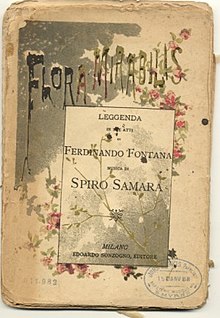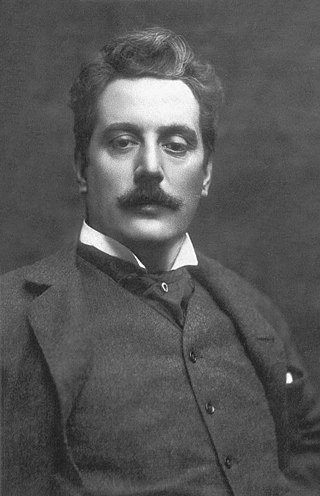
Giacomo Puccini was an Italian composer known primarily for his operas. Regarded as the greatest and most successful proponent of Italian opera after Verdi, he was descended from a long line of composers, stemming from the late-Baroque era. Though his early work was firmly rooted in traditional late-19th-century Romantic Italian opera, he later developed his work in the realistic verismo style, of which he became one of the leading exponents.
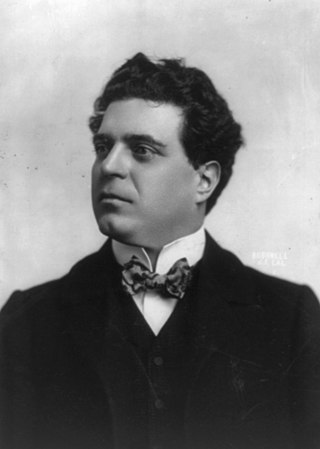
Pietro Mascagni was an Italian composer primarily known for his operas. His 1890 masterpiece Cavalleria rusticana caused one of the greatest sensations in opera history and single-handedly ushered in the Verismo movement in Italian dramatic music. While it was often held that Mascagni, like Ruggero Leoncavallo, was a "one-opera man" who could never repeat his first success, L'amico Fritz and Iris have remained in the repertoire in Europe since their premieres.
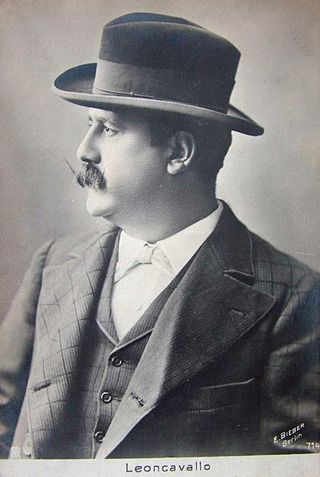
Ruggero Leoncavallo was an Italian opera composer and librettist. Although he produced numerous operas and songs throughout his career it is his opera Pagliacci (1892) that remained his lasting contribution, despite attempts to escape the shadow of his greatest success.
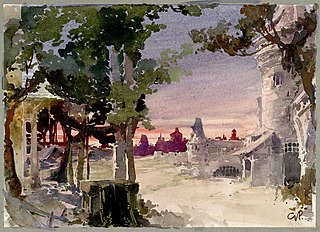
Edgar is an operatic dramma lirico in three acts by Giacomo Puccini to an Italian libretto by Ferdinando Fontana, freely based on the play in verse La Coupe et les lèvres by Alfred de Musset.

Le Villi is an opera–ballet in two acts composed by Giacomo Puccini to an Italian libretto by Ferdinando Fontana, based on the short story "Les Willis" by Jean-Baptiste Alphonse Karr. Karr's story was in turn based in the Central European legend of the Vila, also used in the ballet Giselle. The opera, in its original one-act version, premiered at Milan's Teatro Dal Verme, on 31 May 1884.
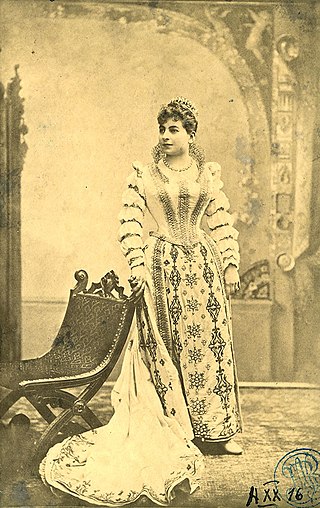
Hariclea Darclée was a celebrated Romanian operatic spinto soprano of Greek descent who had a three-decade-long career.
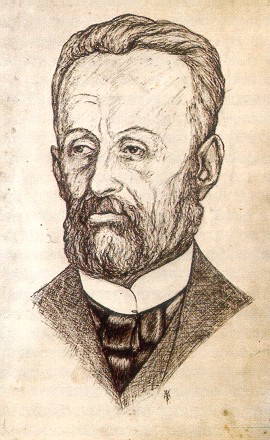
Pavlos Carrer was a Greek composer, one of the leaders of the Ionian art music school and the first to create national operas and national songs on Greek plots, Greek librettos and verses, as well as melodies inspired by the folk and the urban popular musical tradition of modern Greece.

Aureliano in Palmira is an operatic dramma serio in two acts written by Gioachino Rossini to an Italian libretto in which the librettist was credited only by the initials "G. F. R." The libretto has generally been attributed to Felice Romani, but sometimes to the otherwise unknown Gian Francesco Romanelli. It has been suggested that the latter name may have resulted from a confusion of Romani with Luigi Romanelli, La Scala's house poet prior to Romani's appointment to the post.
Spyridon-Filiskos Samaras was a Greek composer particularly admired for his operas who was part of the generation of composers that heralded the works of Giacomo Puccini. His compositions were praised worldwide during his lifetime and he is arguably the most important composer of the Ionian School. He also composed theOlympic Hymn,for which lyrics were written by National Poet Kostis Palamas. Among his works are the operas Flora mirabilis (1886) and Mademoiselle de Belle-Isle (1905).

Ferdinando Fontana was an Italian journalist, dramatist, and poet. He is best known today for having written the libretti of the first two operas by Giacomo Puccini – Le Villi and Edgar.

Romilda Pantaleoni was an Italian dramatic soprano who had a prolific opera career in Italy during the 1870s and 1880s. She sang a wide repertoire that encompassed bel canto roles, Italian and French grand opera, verismo operas, and the German operas of Richard Wagner. She became particularly associated with the roles of Margherita in Boito's Mefistofele and the title role in Ponchielli's La Gioconda; two roles which she performed in opera houses throughout Italy. She is best remembered today for originating the roles of Desdemona in Giuseppe Verdi's Otello (1887) and Tigrana in Giacomo Puccini's Edgar (1889). Universally admired for her acting skills as well as her singing abilities, Pantaleoni was compared by several critics to the great Italian stage actress Eleonora Duse.

Mese mariano is an opera in one act by Umberto Giordano. Its Italian libretto by Salvatore Di Giacomo was adapted from his play 'O Mese Mariano, which was in turn adapted from his novella, Senza vederlo. It premiered at the Teatro Massimo in Palermo on 17 March 1910. The opera is described as a bozzetto lirico and has a running time of 35 minutes. It tells the story of a woman who visits an orphanage to see her child. Racked with guilt at having abandoned him, she is unaware that he had died the night before.
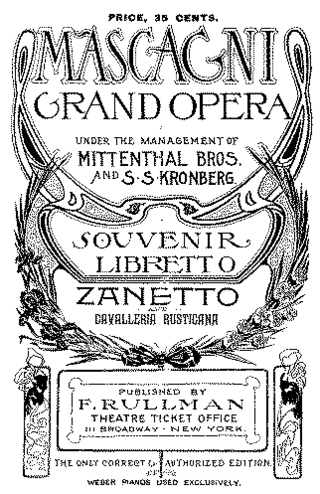
Zanetto is an opera in one act by Pietro Mascagni to an Italian libretto by Giovanni Targioni-Tozzetti and Guido Menasci. It received its first performance on 2 March 1896 at the Liceo Musicale Rossini in Pesaro. Only 40 minutes long and with cast of two singers, Zanetto was originally described by its composer as a scena lirica rather than an opera. It is set in the countryside near Florence during the Renaissance and tells the story of an encounter between a beautiful courtesan, Silvia, and a young wandering minstrel, Zanetto. The libretto was adapted from an Italian translation by Emilio Praga of François Coppée's play Le passant in which the young Sarah Bernhardt had won fame in the en travesti role of Zanetto.
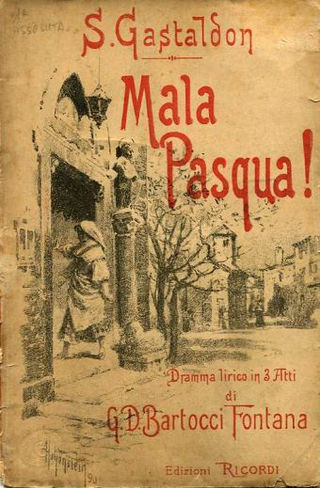
Mala Pasqua! is an opera in three acts composed by Stanislao Gastaldon to a libretto by Giovanni Domenico Bartocci-Fontana. The libretto is based on Giovanni Verga's play, Cavalleria rusticana which Verga had adapted from his short story of the same name. Mala Pasqua! premiered on 9 April 1890 at the Teatro Costanzi in Rome, six weeks before Pietro Mascagni's opera Cavalleria rusticana which was also based on Verga's play. Bartocci-Fontana's libretto adds some elements that were not in Verga's original and expands on others. The name of the Santuzza character was also changed to Carmela, but the basic plot and setting remain the same. Its title refers to the curse which Carmela places on Turiddu, the lover who had spurned her: "Mala Pasqua a te!". Following its Rome premiere, Mala Pasqua! had a few more performances in Perugia and Lisbon, but it was completely eclipsed by the phenomenal success of Mascagni's opera. After the 1891 Lisbon run it was not heard again until 2010 when it was given a semi-staged performance in Agrigento, Sicily.

Gloria is a tragic opera in three acts by Francesco Cilea with an Italian libretto by Arturo Colautti. A variation on the Romeo and Juliet story and set in 14th century Siena, the libretto is based on Victorien Sardou's 1874 play La Haine (Hatred). The opera premiered on 15 April 1907 at La Scala conducted by Arturo Toscanini with Solomiya Krushelnytska in the title role. Gloria was a failure at its premiere when it was withdrawn after two performances and fared little better in the 1932 revised version, although there have been two late 20th century revivals. It proved to be Cilea's last staged opera. In the 43 years following the premiere of Gloria he worked on two or three further operas which were never performed and continued to compose chamber and orchestral music.

Sì is an operetta in three acts composed by Pietro Mascagni to a libretto by Carlo Lombardo with verses by Arturo Franci. The libretto is based on Lombardo's operetta La duchessa del Bal Tabarin and Felix Dörmann's libretto for Majestät Mimi set by Bruno Granichstaedten in 1911. Mascagni's only venture into operetta, it premiered on 13 December 1919 at the Teatro Quirino in Rome. The operetta takes its name from its central character, Sì, an actress at the Folies Bergère, so called because she could never say no.

Claudio Guastalla was an Italian opera librettist.

Il curioso indiscreto, is an opera in three acts composed by Pasquale Anfossi. The libretto is based on an episode from the 17th-century Spanish novel Don Quixote. The librettist is not known for sure but is thought to be either Giovanni Bertati or Giuseppe Petrosellini. The opera premiered at the Teatro delle Dame in Rome during the Carnival season of 1777.

The Teatro Carcano is a theatre in Milan, Italy, located at 63 Corso di Porta Romana. Although now exclusively devoted to plays and dance, it served as an opera house for much of the 19th century and saw the premieres of several important operas. Completed in 1803, the theatre was commissioned by the Milanese aristocrat and theatre-lover Giuseppe Carcano and originally designed by Luigi Canonica. Over the succeeding two centuries it has undergone several restructurings and renovations and for a time in the mid-20th century functioned as a cinema.

Isabella d'Aspeno is an opera in three acts composed by Pavlos Carrer. The author of its Italian-language libretto is credited only with the initials "R.G.S.". The opera premiered at the Teatro San Giacomo in Corfu on 7 February 1854. The following year, the opera had its Italian premiere at Milan's Teatro Carcano where it achieved considerable success with multiple performances over two seasons. Set in Westphalia during the 14th Century, the plot of Isabella d'Aspeno bears several thematic similarities to Verdi's later opera, Un ballo in maschera. Both involve the assassination of a sovereign by his political and romantic rival during a masquerade ball.
